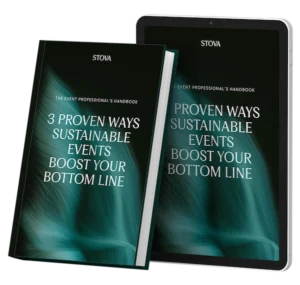Sustainable Corporate Event Planning Practices
February 1, 2024
While planning for corporate events, sustainability has emerged as a fundamental principle reshaping the landscape of gatherings worldwide. From reducing environmental footprints to fostering socially responsible practices, integrating sustainability into events has become a paramount consideration for event managers and their event technology partners.
Here’s a closer look at how sustainable approaches can redefine corporate event planning:
Ongoing Digital Transformation
The shift towards digital platforms and virtual offerings offers planners and event managers a powerful tool to reduce paper consumption and environmental impact. By leveraging virtual invitations, registrations, and event materials, organizers can streamline communication while minimizing waste associated with traditional print materials. Mobile event apps not only simplify logistics but also contribute to a more sustainable event experience by reducing reliance on paper-based materials. Consider QR codes for registration, event collateral, and business cards.
Upgrading Energy-Efficient Solutions
Investing in energy-efficient technologies presents an opportunity to reduce energy consumption without compromising event experiences. From LED lighting systems to energy-saving AV equipment, planners can prioritize energy-efficient solutions to minimize environmental impact while maintaining high-quality event standards for their next corporate event. Furthermore, at the higher end of the spectrum, choosing event spaces with renewable energy sources such as solar or wind power can further enhance the sustainability of corporate events, aligning with the broader goal of reducing carbon emissions. Utilizing an event technology solution that offers end-to-end solutions is one way to reduce use of single-point solutions. Learn more about tech consolidation.
Virtual and Hybrid Events

Embracing virtual and hybrid event models enables planners to reduce carbon emissions associated with travel while expanding reach and accessibility. By leveraging virtual technologies, organizers can host engaging events that seamlessly integrate in-person and virtual components, offering flexibility and sustainability without sacrificing engagement.
Waste Reduction Strategies
Collaboration with eco-conscious vendors and implementation of recycling programs are integral to reducing waste generation throughout the event lifecycle. Planners can opt for compostable serving ware, donate leftover materials, and prioritize sustainable procurement practices to minimize environmental impact and promote waste reduction. Additionally, encouraging attendees to participate in waste reduction efforts by providing recycling bins and promoting sustainable practices can further enhance the sustainability of corporate events. Consider on-site water fountains to reduce plastic waste. Consider attending shows like Event Sustainability Live – a trade show focused on connecting you to vendors and providers dedicated to sustainability solutions.
Data-Driven Sustainability Metrics
Utilizing analytics and reporting tools empowers planners to measure sustainability metrics and track key performance indicators such as carbon emissions, waste diversion rates, and resource utilization. By leveraging data-driven insights, organizers can make informed decisions and continuously improve sustainability practices for future events. Analyzing sustainability metrics not only helps identify areas for improvement but also demonstrates a commitment to transparency and accountability in corporate event planning.
Stakeholder Collaboration
Fostering partnerships with clients, venues, suppliers, and industry peers is essential for driving collective action towards sustainability. Through collaboration and knowledge sharing, planners can inspire innovation and cultivate a culture of sustainability within the event industry, paving the way for meaningful change. By engaging stakeholders in sustainability initiatives, organizers can harness collective expertise and resources to implement impactful sustainability strategies that benefit the environment and shift events into a more sustainable future.
Educational Initiatives
Equipping event organizers and attendees with knowledge about sustainability is crucial for fostering long-term environmental stewardship. Planners can offer educational initiatives such as webinars, workshops, and resource guides to empower stakeholders with practical strategies for integrating sustainability into events and raising awareness about the importance of sustainable practices. Educating attendees about the environmental impact of events and highlighting the benefits of sustainable practices can inspire behavior change and encourage broader adoption of sustainable event planning principles.

Sustainability is a guiding principle that has the power to redefine corporate event planning for the better. By embracing sustainable approaches, event planners and stakeholders can not only reduce environmental impact but also drive positive change within the industry.
Whether your event is virtual, hybrid, or in-person, enhance your attendee’s journey with an event ecosystem built for your audience. Ready to walk through Stova's event technology solutions? Schedule some time with us today.

